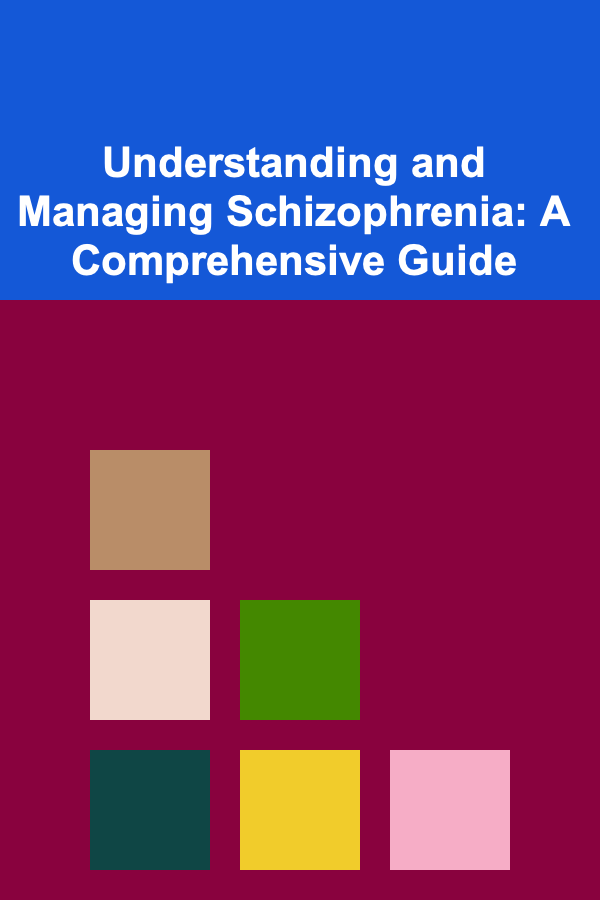
Understanding and Managing Schizophrenia: A Comprehensive Guide
ebook include PDF & Audio bundle (Micro Guide)
$12.99$5.99
Limited Time Offer! Order within the next:

Schizophrenia is a chronic, severe brain disorder that affects a person's ability to think, feel, and behave clearly. It is characterized by a constellation of symptoms that can significantly impair an individual's functioning in various aspects of life, including work, relationships, and self-care. Understanding the complexities of schizophrenia, including its causes, symptoms, and available treatments, is crucial for effective management and improving the lives of individuals living with this condition.
What is Schizophrenia?
Schizophrenia is not a split personality, as is often mistakenly portrayed. Instead, it is a psychosis, meaning a condition that affects the way the brain processes information. People with psychosis experience a loss of contact with reality, which can manifest as hallucinations, delusions, disorganized thinking, and unusual behavior.
The Diagnostic and Statistical Manual of Mental Disorders, 5th Edition (DSM-5), outlines the diagnostic criteria for schizophrenia. These criteria include experiencing two or more of the following symptoms for a significant portion of time during a one-month period, with at least one of these symptoms being delusions, hallucinations, or disorganized speech:
- Delusions: False beliefs that are firmly held even when confronted with evidence to the contrary. These beliefs can be bizarre (e.g., believing that aliens are controlling their thoughts) or non-bizarre (e.g., believing that they are being followed).
- Hallucinations: Sensory experiences that occur in the absence of external stimuli. They can involve any of the senses, but auditory hallucinations (hearing voices) are the most common.
- Disorganized Speech: Difficulty organizing thoughts and expressing them coherently. This can manifest as rambling, incoherent speech, tangential responses, or "word salad" (a jumble of words that make no sense).
- Grossly Disorganized or Catatonic Behavior: Disorganized behavior can include unpredictable agitation, childlike silliness, or problems performing goal-directed tasks. Catatonic behavior involves a marked decrease in reactivity to the environment, ranging from stupor (unresponsiveness) to rigidity (maintaining a fixed posture).
- Negative Symptoms: A decrease in or absence of normal functions. These symptoms can include:
- Flat Affect: Reduced emotional expression, such as a blank facial expression or monotone voice.
- Alogia: Poverty of speech, characterized by brief, empty replies.
- Avolition: Lack of motivation or interest in activities.
- Anhedonia: Inability to experience pleasure.
- Social Withdrawal: Reduced social interaction and engagement.
For a diagnosis of schizophrenia, these symptoms must cause significant impairment in social, occupational, or self-care functioning and must be present for at least six months, with at least one month of active-phase symptoms (delusions, hallucinations, disorganized speech, grossly disorganized or catatonic behavior).
Understanding the Causes of Schizophrenia
The exact cause of schizophrenia is not fully understood, but research suggests that it is likely a complex interplay of genetic, biological, and environmental factors.
Genetic Factors:
Genetics play a significant role in the development of schizophrenia. Individuals with a family history of schizophrenia are at a higher risk of developing the disorder themselves. While there is no single "schizophrenia gene," multiple genes are thought to contribute to vulnerability. These genes may affect brain development, neurotransmitter function, and other processes involved in mental health.
Biological Factors:
Brain abnormalities are commonly observed in individuals with schizophrenia. These abnormalities can include:
- Neurotransmitter Imbalances: An imbalance of neurotransmitters, particularly dopamine and glutamate, is believed to play a crucial role in the symptoms of schizophrenia. The dopamine hypothesis suggests that excessive dopamine activity in certain brain regions contributes to positive symptoms like hallucinations and delusions. Glutamate, another important neurotransmitter, is also implicated in schizophrenia, with evidence suggesting that reduced glutamate activity may contribute to negative symptoms and cognitive deficits.
- Brain Structure and Function: Studies have shown differences in brain structure and function between individuals with schizophrenia and those without the disorder. These differences can include:
- Enlarged Ventricles: The ventricles are fluid-filled spaces in the brain. Enlarged ventricles have been observed in some individuals with schizophrenia, suggesting a loss of brain tissue.
- Reduced Gray Matter Volume: Gray matter is the brain tissue that contains most of the brain's neurons. Reduced gray matter volume, particularly in the prefrontal cortex and temporal lobes, has been associated with schizophrenia. These areas are crucial for executive function, memory, and language processing.
- Abnormal Brain Activity: Brain imaging studies have revealed abnormal brain activity patterns in individuals with schizophrenia, particularly in the prefrontal cortex, which is involved in higher-level cognitive functions.
Environmental Factors:
Environmental factors can also increase the risk of developing schizophrenia, particularly in individuals who are genetically predisposed. These factors include:
- Prenatal Complications: Exposure to certain complications during pregnancy, such as maternal malnutrition, viral infections, or stress, can increase the risk of schizophrenia in the offspring. These complications can disrupt brain development and increase vulnerability to the disorder.
- Birth Complications: Birth complications, such as oxygen deprivation, can also increase the risk of schizophrenia.
- Early Childhood Trauma: Experiences of abuse, neglect, or other forms of trauma during childhood can increase the risk of developing schizophrenia later in life. Trauma can disrupt brain development and increase vulnerability to mental illness.
- Substance Abuse: Drug use, particularly cannabis and stimulants, can increase the risk of developing psychosis and schizophrenia, especially in individuals who are already vulnerable.
- Social Factors: Social isolation, poverty, and discrimination can also contribute to the development of schizophrenia. These factors can increase stress and reduce access to support systems, increasing vulnerability to mental illness.
Recognizing the Symptoms of Schizophrenia
Recognizing the symptoms of schizophrenia is crucial for early diagnosis and treatment. The symptoms of schizophrenia can vary from person to person and can change over time. They are often categorized into positive, negative, and cognitive symptoms.
Positive Symptoms:
Positive symptoms are those that are "added" to a person's experience and are not typically present in healthy individuals. They include:
- Delusions: Fixed false beliefs that are not based on reality. Common types of delusions include:
- Persecutory Delusions: The belief that one is being harmed, harassed, or conspired against.
- Grandiose Delusions: The belief that one has exceptional abilities, wealth, or fame.
- Referential Delusions: The belief that certain gestures, comments, or environmental cues are directed at oneself.
- Erotomanic Delusions: The belief that another person, often someone famous or of high status, is in love with them.
- Nihilistic Delusions: The belief that a major catastrophe will occur or that one is dead, nonexistent, or decaying.
- Somatic Delusions: Delusions that focus on bodily sensations or functions.
- Hallucinations: Sensory experiences that occur in the absence of external stimuli. Common types of hallucinations include:
- Auditory Hallucinations: Hearing voices, which may be familiar or unfamiliar, and may be critical, commanding, or neutral.
- Visual Hallucinations: Seeing things that are not there.
- Tactile Hallucinations: Feeling sensations on the skin that are not real.
- Olfactory Hallucinations: Smelling odors that are not present.
- Gustatory Hallucinations: Tasting flavors that are not present.
- Disorganized Thinking (Speech): Difficulty organizing thoughts and expressing them coherently. This can manifest as:
- Derailment or Loose Associations: Switching from one topic to another with no logical connection.
- Tangentiality: Answering questions in a way that is only marginally related or completely unrelated.
- Incoherence or "Word Salad": Speech that is incomprehensible due to a jumble of words.
- Clang Associations: Speech based on rhyming or similar-sounding words.
- Disorganized or Abnormal Motor Behavior: Unpredictable or inappropriate behavior that can range from childlike silliness to agitation. Catatonic behavior is a severe form of disorganized behavior that involves a marked decrease in reactivity to the environment.
Negative Symptoms:
Negative symptoms are those that represent a decrease in or absence of normal functions. They include:
- Flat Affect: Reduced emotional expression, characterized by a blank facial expression, monotone voice, and limited use of gestures.
- Alogia: Poverty of speech, characterized by brief, empty replies.
- Avolition: Lack of motivation or interest in activities. This can manifest as difficulty starting or completing tasks, neglecting personal hygiene, and withdrawing from social activities.
- Anhedonia: Inability to experience pleasure.
- Social Withdrawal: Reduced social interaction and engagement.
Cognitive Symptoms:
Cognitive symptoms involve difficulties with attention, memory, and executive functions. These symptoms can significantly impact daily functioning and are often subtle and difficult to detect. They include:
- Attention Deficits: Difficulty focusing and maintaining attention.
- Memory Problems: Difficulty remembering information, both recent and past events.
- Executive Dysfunction: Difficulties with planning, organizing, problem-solving, and decision-making.
- Impaired Working Memory: Difficulty holding information in mind and manipulating it.
Managing Schizophrenia: A Multidisciplinary Approach
Schizophrenia is a complex disorder that requires a comprehensive and multidisciplinary approach to management. Treatment typically involves a combination of medication, therapy, and psychosocial support.
Medication:
Antipsychotic medications are the cornerstone of treatment for schizophrenia. They help to reduce the severity of positive symptoms such as hallucinations, delusions, and disorganized thinking. There are two main types of antipsychotics:
- First-Generation Antipsychotics (FGAs): Also known as typical antipsychotics, these medications primarily block dopamine receptors in the brain. They are effective in reducing positive symptoms but can have significant side effects, including:
- Extrapyramidal Symptoms (EPS): Movement disorders such as muscle stiffness, tremors, and involuntary movements.
- Tardive Dyskinesia (TD): A potentially irreversible movement disorder characterized by involuntary movements of the face, tongue, and limbs.
- Second-Generation Antipsychotics (SGAs): Also known as atypical antipsychotics, these medications block both dopamine and serotonin receptors. They are generally considered to have fewer EPS side effects than FGAs, but they can have other side effects, such as:
- Weight Gain: SGAs can cause significant weight gain, which can increase the risk of metabolic problems such as diabetes and cardiovascular disease.
- Metabolic Syndrome: A cluster of conditions, including high blood pressure, high blood sugar, abnormal cholesterol levels, and excess abdominal fat, that increase the risk of heart disease, stroke, and diabetes.
- Sedation: SGAs can cause drowsiness and fatigue.
The choice of antipsychotic medication is individualized and depends on factors such as the patient's symptoms, side effect profile, and response to previous medications. It is essential to work closely with a psychiatrist to find the most effective medication with the fewest side effects. Adherence to medication is crucial for preventing relapse and maintaining stability.
Psychotherapy:
Psychotherapy, or talk therapy, can be a valuable addition to medication in the treatment of schizophrenia. It can help individuals with schizophrenia to:
- Develop Coping Skills: Learn strategies to manage symptoms such as hallucinations and delusions.
- Improve Social Skills: Develop skills to interact effectively with others and build relationships.
- Enhance Problem-Solving Skills: Learn to identify and solve problems in daily life.
- Increase Self-Esteem: Develop a more positive self-image and sense of self-worth.
- Improve Adherence to Treatment: Understand the importance of medication and other treatments and develop strategies to adhere to them.
- Reduce Stress and Anxiety: Learn relaxation techniques and other strategies to manage stress and anxiety.
Common types of psychotherapy used in the treatment of schizophrenia include:
- Cognitive Behavioral Therapy (CBT): CBT helps individuals identify and change negative thought patterns and behaviors that contribute to their symptoms. It can be particularly helpful in managing delusions and hallucinations.
- Family Therapy: Family therapy involves working with the individual with schizophrenia and their family members to improve communication, reduce conflict, and provide support. It can help families understand the disorder and learn how to best support their loved one.
- Social Skills Training: Social skills training helps individuals develop the social skills needed to interact effectively with others. It can involve role-playing, modeling, and feedback.
- Supportive Therapy: Supportive therapy provides a safe and supportive environment for individuals to discuss their feelings and experiences. It can help them to build self-esteem and cope with the challenges of living with schizophrenia.
Psychosocial Support:
Psychosocial support services can play a crucial role in helping individuals with schizophrenia to live fulfilling and productive lives. These services can include:
- Supported Employment: Supported employment programs help individuals with schizophrenia to find and maintain employment. They can provide job training, job coaching, and ongoing support.
- Supported Housing: Supported housing programs provide individuals with schizophrenia with safe and affordable housing. They can also provide support services such as case management and medication management.
- Assertive Community Treatment (ACT): ACT is a team-based approach to care that provides comprehensive support services to individuals with severe mental illness in the community. ACT teams typically include psychiatrists, nurses, social workers, and other professionals.
- Case Management: Case management services help individuals with schizophrenia to access the services they need, such as housing, employment, and medical care.
- Peer Support: Peer support groups provide individuals with schizophrenia with opportunities to connect with others who have similar experiences. These groups can provide a sense of community and support.
The Importance of Early Intervention
Early intervention is crucial for improving the long-term outcomes of individuals with schizophrenia. Research has shown that early treatment can:
- Reduce the Severity of Symptoms: Early treatment can help to prevent the development of severe and disabling symptoms.
- Improve Functioning: Early treatment can help individuals to maintain their social, occupational, and academic functioning.
- Prevent Relapse: Early treatment can help to prevent relapse and hospitalization.
- Improve Quality of Life: Early treatment can improve overall quality of life.
If you or someone you know is experiencing symptoms of psychosis, it is important to seek help from a mental health professional as soon as possible.
Living with Schizophrenia: Tips for Individuals and Families
Living with schizophrenia can be challenging, but with the right support and treatment, individuals with schizophrenia can lead fulfilling and productive lives.
Tips for Individuals with Schizophrenia:
- Adhere to Your Treatment Plan: Take your medication as prescribed and attend therapy appointments regularly.
- Develop Coping Strategies: Learn strategies to manage your symptoms, such as relaxation techniques and thought-stopping techniques.
- Maintain a Healthy Lifestyle: Eat a healthy diet, get regular exercise, and get enough sleep.
- Avoid Substance Abuse: Avoid alcohol and drugs, as they can worsen your symptoms.
- Build a Support Network: Connect with family, friends, and other people who can provide support.
- Set Realistic Goals: Set achievable goals for yourself and celebrate your successes.
- Be Patient: Recovery from schizophrenia can take time. Be patient with yourself and celebrate your progress.
Tips for Families of Individuals with Schizophrenia:
- Educate Yourself: Learn as much as you can about schizophrenia.
- Be Supportive: Provide emotional support and encouragement.
- Encourage Treatment Adherence: Help your loved one to take their medication and attend therapy appointments.
- Learn Communication Skills: Learn how to communicate effectively with your loved one.
- Set Boundaries: Set clear boundaries and expectations.
- Take Care of Yourself: It is important to take care of your own physical and emotional health.
- Seek Support: Join a support group for families of individuals with schizophrenia.
Conclusion
Schizophrenia is a complex and challenging disorder, but with understanding, effective treatment, and ongoing support, individuals with schizophrenia can live fulfilling and productive lives. Early intervention is crucial for improving long-term outcomes. By working together, individuals with schizophrenia, their families, and mental health professionals can create a brighter future for those living with this condition.

How to Create a Daily Cleaning Checklist for Your Home
Read More
How to Host a Family Puzzle Night for Bonding
Read More
Savvy Thrift Store Shopping Tips to Maximize Your Savings
Read More
The Art and Practice of Forgiveness Meditation
Read More
How to Plan a Twitch Schedule for Maximum Viewer Engagement
Read More
How to Plan a Relaxing Cozy Gaming Experience
Read MoreOther Products

How to Create a Daily Cleaning Checklist for Your Home
Read More
How to Host a Family Puzzle Night for Bonding
Read More
Savvy Thrift Store Shopping Tips to Maximize Your Savings
Read More
The Art and Practice of Forgiveness Meditation
Read More
How to Plan a Twitch Schedule for Maximum Viewer Engagement
Read More